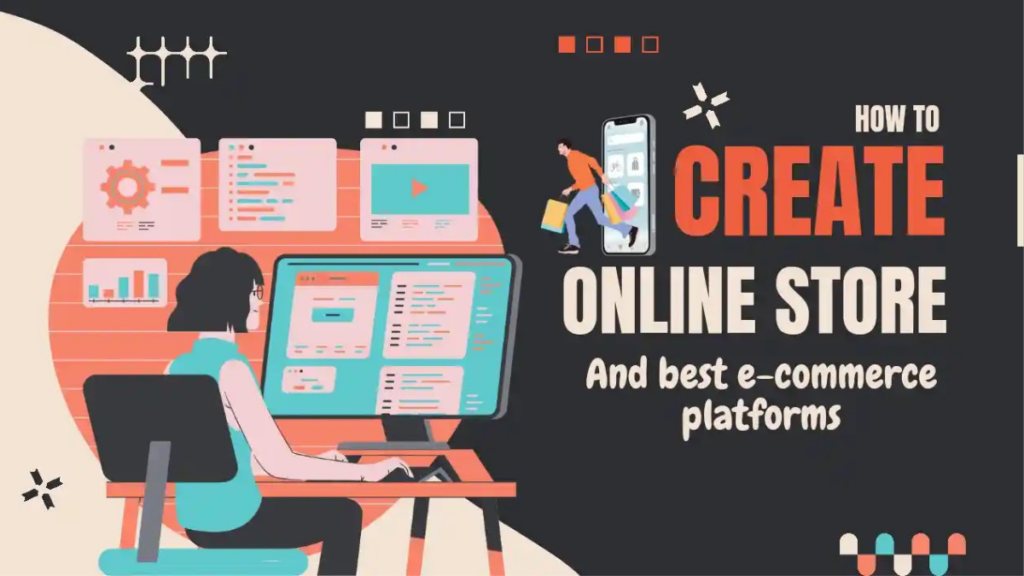The decision to set up an online store is one of the most lucrative choices you can make in today’s digital age. With the advent of e-commerce websites, you have access to a wide range of resources and tools that can make the process of creating and managing an online store much easier.
Table of Contents
e-commerce platforms
In this article, I will discuss the benefits of using ecommerce platforms, the best ecommerce platforms available, and some tips for building a successful online store
Introduction to E-Commerce Sites
E-commerce sites are online platforms that provide entrepreneurs with the necessary tools to build, manage and grow an online store. These platforms provide a diverse array of functionalities, encompassing customizable storefront design templates, streamlined payment processing, efficient inventory management, and integrated shipping and tax calculators.
The benefits of using e-commerce sites are numerous, and they include the ability to reach a global audience, lower overhead costs, and increased sales.
Benefits of Using e-commerce Platforms
One of the most significant benefits of using e-commerce platforms is the ability to reach a global audience. Unlike traditional brick-and-mortar stores, online stores are not limited by geographical boundaries.
This means that you can sell your products to customers from all over the world, which can significantly increase your sales revenue.
Additionally, e-commerce platforms offer lower overhead costs compared to traditional stores. With e-commerce, you don’t have to pay for rent, utilities, or other expenses associated with operating a physical store.
Another advantage of using e-commerce platforms is the ability to increase sales. E-commerce websites offer a range of tools that can help you optimize your online store for conversions. These tools include abandoned cart recovery, product recommendations, and upselling features.
By utilizing these tools, you can increase the average order value and generate more revenue.
Top E-Commerce Platforms
There are many e-commerce platforms available, but in this article, we will focus on the top four: Shopify, WooCommerce, BigCommerce, and Magento. Each platform has its own unique features and benefits, and the one you choose will depend on your business needs and goals.
This is the best e-commerce sites
Shopify – and why It’s the Best e-commerce site
Shopify is the most popular e-commerce platform available, and for good reason. It’s user-friendly, affordable, and offers a range of features that make it easy to build and manage an online store. One of the best things about Shopify is that it’s an all-in-one platform, which means that you don’t have to worry about finding third-party apps to add functionality to your store.
Features of Shopify That Make It the Best
Shopify offers a range of features that make it the best e-commerce platform available. For starters, it offers a range of customizable storefront templates that allow you to create a unique brand identity for your store.
Additionally, Shopify offers a range of marketing tools that can help you reach new customers and increase sales. These tools include email marketing integrations, social media integrations, and SEO optimization.
Other Top E-Commerce Platforms – WooCommerce, BigCommerce, Magento
WooCommerce is an open-source e-commerce plugin for WordPress that offers a range of features for building an online store. It’s free to use and customizable, making it an excellent choice for entrepreneurs on a tight budget.
BigCommerce stands as a prominent e-commerce platform, renowned for its comprehensive selection of features and seamless integrations.
It’s more expensive than Shopify but offers more advanced features for larger businesses. Magento is an enterprise-level e-commerce platform that’s designed for businesses with complex needs. It’s the most expensive platform on this list but offers the most advanced features.
Comparison of the Top E-Commerce Platforms
When selecting an e-commerce platform, it is crucial to carefully evaluate your specific business needs and objectives. By understanding your requirements and goals, you can choose a platform that aligns with your vision and provides the necessary tools and functionalities to support your online business effectively.
Shopify is the best option for small to medium-sized businesses that want an affordable and easy-to-use platform.
WooCommerce is an excellent choice for businesses that are already using WordPress and want a free and customizable platform.
BigCommerce is suitable for larger businesses that need more advanced features and integrations. Magento is the best option for enterprise-level businesses that require a high level of customization and functionality.
How to choose the Best E-Commerce Platform for Your Business
There are various factors that need to be considered when selecting an e-commerce platform.. These include your budget, business needs, and future goals. It’s essential to choose a platform that offers the features and functionality you need to grow your business. Additionally, you should consider the platform’s pricing and plans to ensure that it’s affordable and scalable.
More e-commerce websites
Wix:
Wix is a website builder that also offers e-commerce capabilities. It provides a drag-and-drop interface, a variety of templates, and seamless integration with payment gateways. Wix is known for its beginner-friendly approach and is suitable for small businesses and individuals.
Volusion:
Volusion is an all-in-one e-commerce platform that offers a range of features, including customizable templates, secure payment processing, inventory management, and marketing tools. It provides an easy-to-use interface and is suitable for small to medium-sized businesses.
PrestaShop:
PrestaShop is a free and open-source e-commerce platform that allows you to create and manage your online store. It offers a vast selection of themes and modules, giving you flexibility in customizing your store. PrestaShop supports multiple languages and currencies, making it ideal for businesses targeting international markets.
3dcart:
3dcart is a feature-rich e-commerce platform that caters to businesses of all sizes. It offers a wide range of customizable templates, advanced SEO tools, secure payment options, and integration with popular third-party applications. 3dcart also provides excellent customer support.
Salesforce Commerce Cloud:
Salesforce Commerce Cloud, formerly known as Demandware, is a robust enterprise-level e-commerce platform. It offers highly scalable solutions for large businesses and provides extensive customization options, advanced marketing capabilities, and seamless integration with other Salesforce products.
Tips for Building a Successful Online Store
Building a successful online store requires more than just choosing the right e-commerce platform. It requires a range of strategies and tactics to optimize your store for conversions. Some tips for building a successful online store include optimizing your product pages for SEO, offering free shipping, and providing excellent customer service.
E-Commerce Platform Pricing and Plans
E-commerce platform pricing varies depending on the platform you choose and the features you need. Shopify offers a range of pricing plans that start at 299 per month for the advanced plan. WooCommerce is free to use, but you’ll need to pay for hosting and other add-ons. BigCommerce starts at 299.95 per month for the enterprise plan. Magento’s pricing is customized, and you’ll need to contact their sales team for a quote.
Finally
building an online store is one of the most profitable choices you can make in today’sto digital age. E-commerce platforms offer a range of features and benefits that can help you reach a global audience, increase sales, and lower overhead costs.
The top e-commerce platforms available include Shopify, WooCommerce, BigCommerce, and Magento. When choosing an e-commerce platform, it’s essential to consider your business needs and goals to ensure that you choose the best platform for your needs










